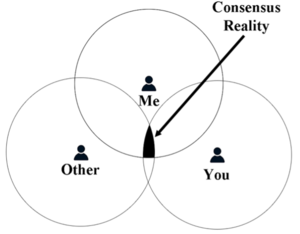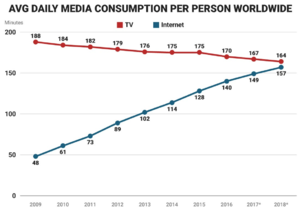Consensus Reality
“You are not a passive receiver of the world. You are an active participant in creating your reality.” - Tim Leary
Consensus reality is the shared understanding of facts and truth upheld by a group—be it a community, culture, or society at large. It emerges when enough people agree on “what is,” creating a collective map of reality that governs how we interpret the world around us (see Figure 1).
For much of the modern era, particularly before the internet, consensus reality was shaped by centralized mass media. Television, radio, and newspapers broadcasted uniform narratives to broad audiences, fostering a relatively stable and unified worldview. Millions tuned into the same programs, heard the same voices, and adopted a common cultural lens.
But that era has passed.
Today, as traditional broadcast models decline (see Figure 2), we live in a fragmented media landscape shaped by algorithms, reinforcing echo chambers of personal bias. Information is no longer funneled through a few institutional gatekeepers. Instead, it’s scattered across social media feeds, niche platforms, and personalized recommendation engines. What was once a coherent cultural narrative has splintered into a mosaic of “reality tunnels”—individualized and often incompatible worldviews shaped by one's personalised digital environment.
This collapse of consensus explains many of our current cultural tensions—from rising political polarization to the growing alienation between people who once shared the same assumptions. The friction isn’t just ideological—it’s perceptual. We are no longer seeing the same world.
And yet, disruption often clears the way for something new.
In this moment of uncertainty, psychedelics offer a powerful countercurrent. They interrupt the habitual narratives imposed by society and invite direct experiences of meaning, presence, and self-awareness. Rather than reinforcing consensus, psychedelics dissolve it—revealing the possibility of truths rooted not in collective agreement, but in personal insight.
Increasingly, people are turning to psychedelics not for escapism, but for clarity. These altered states are becoming tools for inner exploration, emotional healing, and radical curiosity about the nature of reality itself. Much like the printing press once shattered the monopoly on knowledge, psychedelics may be catalyzing a shift in human consciousness—away from externally dictated truth and toward a more diverse, decentralized understanding of what it means to be awake and alive.
In a time of cultural breakdown, they may be helping us imagine—and perhaps even co-create—a new kind of shared reality: one that honors multiplicity without losing connection.

